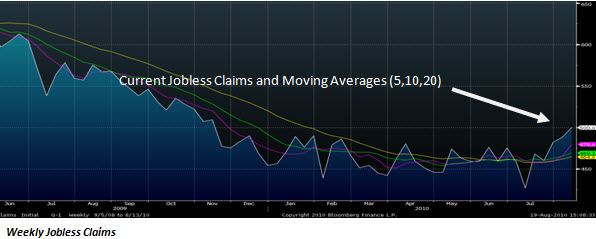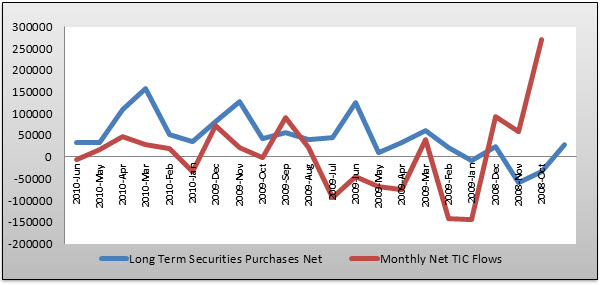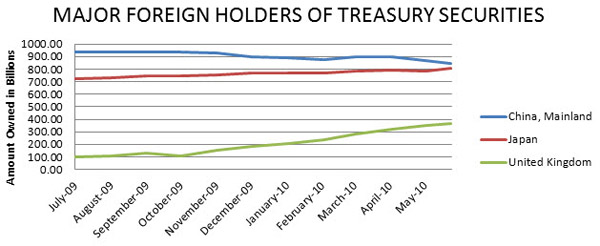US Economic Data
Jobless Claims and Philadelphia Fed Index
This week the US economy saw an unexpected large increase in unemployment claims (for the week ending August 14th) as reported by the US Department of Labor. Jobless claims rose to 500,000 which was 16,000 more than were lost last week, before any revisions. Economists were expecting between 460,000 and 488,000 jobs lost last week, with a median of 478,000.
In this week’s report, the last jobless claims report was revised up by 4,000 jobs – that was from 484,000 to 488,000 jobs lost. As for the current jobless trend, the recent claims number is well above its moving averages, which are all indicating an increasing trend (see chart). This does not necessarily have any bearing on the future claims, but does clarify the current trend.
Jobless claims also rose on the federal government level. These numbers did not seem to bode well for the stock market, which attempts to price in future economic change in the US.
Also on Thursday, the Philadelphia Fed Business Outlook Survey Index was released. The index, which is meant to measure changes in business growth, was expected to see +7 for August, while the actual number was -7.7. As these numbers were released, the stock market saw a quick and dramatic drop (about 100 points in the DJI) as the index numbers were much less than expected. As reported by Bloomberg,
“The Federal Reserve Bank of Philadelphia’s general economic index fell to minus 7.7 this month, the lowest reading since July 2009, from 5.1 in July. Readings less than zero signal contraction in the area covering eastern Pennsylvania, southern New Jersey and Delaware.”
– Alex Tarhini
US TIC data
This week the United States Department of the Treasury released TIC data for June 2010. Long-Term security purchases increased by $44.4 billion. Short-Term security investments also increased by 10.6 billion dollars. TIC data measures cross border investment flow.
For the month of June, it seems that both private and official investors sold corporate bonds and equities. Capital seems to have flowed into agency debt and government debt; both private and official investors were net buyers. However, monthly net TIC flows were negative. This is largely attributable to a reduction in bank owned foreign liabilities.
It is also interesting to note that although net foreign purchases of long term securities increased, China, the top holder of United States debt, continued to sell. Since the month of July in 2009 Japan and Great Britain have been buying American debt. Conversely, China has been selling dollar denominated assets and purchasing debt denominated in other securities.
As discussed in previous wrap ups, the mechanism by which the Chinese government keeps its exchange rate with the United States favorable is through the purchase of American debt. Should the sale of American debt continue in China, both the American currency and the American consumer will be affected. The latter is a function of the former- The Dollar will lose value relative to the Yuan and thus, the American consumer will see higher prices as imports become more expensive.
As uncertainty continues to saturate the market and treasuries rally to all-time highs, it might do some good to question why China is diversifying away from dollar denominated assets.
1. The American consumer cannot be relied on.
2. American debt levels are too high for China to feel safe.
3. American growth prospects are weak at best.
4. 0% interest rates are unattractive, plain and simple.
– Robert Belsky
Article submitted by: Robert Belsky and Alex Tarhini of the Capital Markets Lab (CML). To learn more about the Capital Markets Lab (CML) please visit https://business.fiu.edu/capital-markets-lab/.







